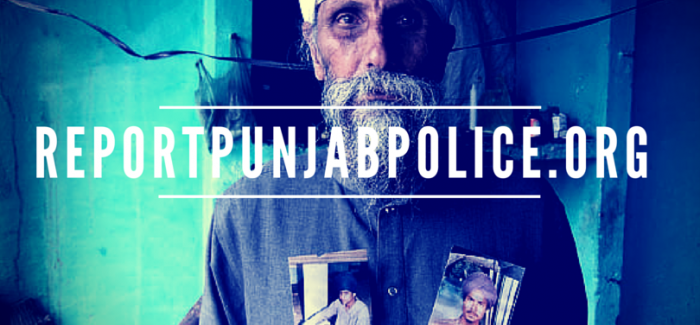New Website to Document Unlawful Killings and Torture by Police in Punjab
Human Rights groups launch ReportPunjabPolice.org to “empower victims”
A web-based form aimed at empowering victims to hold India’s government police agencies accountable has been launched amid a growing international concern for human rights violations among the nation’s northwestern state of Punjab. Released by the Khalra Mission Organisation, the Punjab Human Rights Organisation, and Ensaaf ReportPunjabPolice.org hopes to “shine a spotlight on the officials and institituitons that violate human rights.”
The easy-to-use website form is designed to help change the state-dominated narrative between government law enforcement officers and the public by streamlining information through reports from victims directly to the United Nations and other advocacy organizations. Specifically, the creators say the website is a response to the reports of escalated police violence since October 2015 – which made international headlines after police opened fire on a peaceful protest, killing two people.
Bhajan Singh, Founding Director of Organization for Minorities of India, states: “This new website is a proactive and preemptive step toward protecting human rights in India. It also serves as a warning to officers who plan to get rich by ‘murder-for-hire’ that consequences will be dire.” Singh also said that, “others in Bharat [India] should take a cue from Punjab to organize collectively for a joint fight against oppression of all minorities, women, and oppressed classes.”

Jaswant Singh Khalra
Past attempts to document police torture and killings have resulted in limited convictions of low-level officers and the reporting individuals have faced harsh retaliation. Men like Jaswant Singh Khalra were murdered by the Indian government for uncovering and reporting that death squads of Indian police were rounding up Sikhs in Punjab to torture, kill, and then secretly cremate their bodies at local cremation grounds. In Amritsar alone, Jaswant identified the names of 2,097 Sikhs who were secretly cremated after being murdered by Indian police. On September 6, 1995, he was himself disappeared. Sixteen years later with growing international pressure, the Indian Supreme Court upheld convictions of six local police officers. The statewide police director, KPS Gill, who is alleged to have personally ordered the killing, was never charged.
“Delivering justice in Punjab could set precedents throughout India for the redress of mass state crimes and superior responsibility,” said Jaskaran Kaur, co-director of Ensaaf. “The government’s illegal and inhuman policies in the name of security have allowed a culture of impunity to prevail that has brutalized its police and security forces.”


